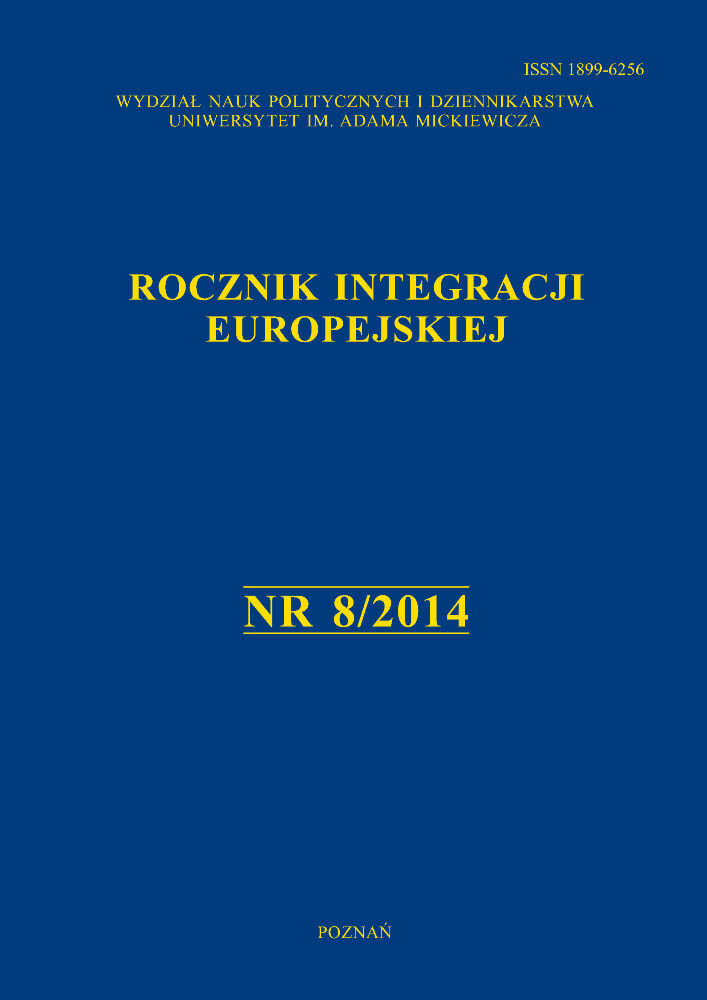Abstract
The European Union acts in numerous capacities on the international arena, and one of its priorities in foreign policy involves the Mediterranean. Since the mid-1990s, the EU has been trying to play several roles in its relations with countries in this region, the most significant being: an active participant in solving the Arab-Israeli conflict; a promoter of measures to build trust, partnership, security and disarmament; a promoter of market reforms and sustainable development; an advocate of democracy and human rights as well as cross-cultural dialogue.
Assessed on the basis of its Mediterranean policy, the efficiency of the EU’s international roles, however, is poor, on account of the conflict between the roles the EU declares to be playing, and its actual and expected roles. As a consequence, the Mediterranean has not transformed into the area of peace, stability, welfare and cross-cultural understanding which has been declared as the EU’s objective since 1995.
References
Abdellatif A. M. (2004), Human Rights in the Arab Mediterranean Countries: Intellectual Discourse. Socio-Economic Background and Legal Instruments, „Mediterranean Politics”, vol. 9, nr 3.
Aggestam L. (1999), Role Conceptions and the Politic of Identity in Foreign Policy, „ARENAWorking Papers”, WP 99/8.
Backman C. W. (1970), Role Theory ad International Relations: A Commentary and Extension, „International Studies Quarterly”, vol. 14, nr 3, s. 310–319.
Bailin N. W. (1980), Foreign Policy Makers and National Role Conceptions, „International Studies Quarterly, nr 4, vol. 24.
Bouris D. (2014), The European Union and Occupied Palestinian Territories. State-building without a state, Routledge, London–New York.
Bremberg N., Driss A., Horst J., Soler Lecha E., Werenfels I. (2009), Flexible Multilateralism: Unlimited Opportunities? The Case of Civil Protection in the Mediterranean Isabelle, „EuroMeSCo Paper”, nr 80.
Breuning M. (2011), Role research: genesis and blind spots, w: Role Theory in International Relations. Approaches and analyses, red. S Harnisch, C. Frank, H. W. Maull, Routledge, London–New York.
Cantir C., Kaarbo J. (2012), Contested Roles and Domestic Politics: Reflections on Role Theory in Foreign Policy Analysis and IR Theory, „Foreign Policy Analysis”, vol. 8.
Danecki J. (2001), Arabowie, Państwowy Instytut Wydawniczy, Warszawa.
Esposito J. L. (1991), Democratisation and Islam, „Middle East Journal”, vol. 45, nr 3.
Harnisch S., Frank C., Maull H.W. (red.) (2011), Role Theory in International Relations. Approaches and analyses, Routledge, London–New York.
Holsti K. (1970), National Role Conception In the Study of Foreign Policy, „International Studies Quarterly”, vol. 14, nr 3.
Jönsson Ch.,Westerlund U. (1982), Role Theory in Foreign Policy Analysis, w: Cognitive Dynamics and International Politics, red. Ch. Jönsson, St. Martin Press, New York.
Krämer G. (1993), Islamist Notions of Democracy, „Middle East Report”, vol. 23, nr 4.
Kukułka J. (1999), Pojmowanie i istota tożsamości narodowej pod koniec XX wieku, w: Nowa tożsamość Niemiec i Rosji w stosunkach międzynarodowych, red. S. Bieleń,W. Góralski,Wydawnictwo Naukowe Scholar, Warszawa.
Maalouf A. (2001), Wyprawy krzyżowe w oczach Arabów, Czytelnik, Warszawa.
Makdisi K., Göksel T., Hauck H. B., Reigeluth S. (2009), UNIFIL II: Emerging and Evolving European Engagement in Lebanon and the Middle East, „EuroMeSCo Paper”, nr 76.
Minasi N. (1998), The Euro-Mediterranean Free Trade Area and its Impact on the Economies Involved, „Jean Monnet Working Paper”, nr 16, Department of Political Studies, University of Catania.
Pace M., Seeberg P. (red.) (2010), European Union’s Democratization Agenda in the Mediterranean, Routledge, New York.
Pietraś Z. J. (1989), Pojęcie i klasyfikacja ról międzynarodowych, UMCS, Międzyuczelniany Instytut Nauk Politycznych, Centralny Program Badań Podstawowych 11.10.2.2.1, Lublin.
Pioppi D., Tocci N., Karam K. (2006), Domestic Politics and Conflict in the Casus of Israel, Palestine and Lebanon, „EuroMeSCo Paper”, nr 53.
Przybylska-Maszner B. (2011), The Arab Spring as a Test of post-Lisbon Capabilities and Strategies of the European Union in North Africa, w: The Arab Spring, red. B. Przybylska-Maszner, Wydawnictwo Naukowe WNPiD UAM, Poznań.
Sadowski E. (1995), Zagadnienie racjonalności i efektywności polityki zagranicznej państwa, „Stosunki Międzynarodowe – International Relations” t. 17.
Sayigh Y. (2007), Security Sector reform in the Arab Region, Challenges to Developing an Indigenous Agenda, Arab Reform Initiative, „Thematic Papers”, nr 2.
Thies C. G. (2010), Role Theory and Foreign Policy, w: The International Studies Encyclopedia, red. R. A. Denemark, vol. X, West Sussex, UK.
Völkel J. C. (2014), More for More, Less for Less – More or Less: A Critique of the EU’s Arab Spring Response à la Cinderella, „European Foreign Affairs Review”, nr 2.
Walker S. G. (red.) (1987), Role Theory and Foreign Policy Analysis, Duke University Press, Durham.
Youngs R. (2006), Europe’s Flawed Approach to Arab Democracy, Centre for European Reform, London.
Zaim F. (1999), The Third Generation of Euro-Mediterranean Association Agreements: A View from the South, „Mediterranean Politics”, vol. 4, nr 2.
Zając J. (red.) (2014), Unia Europejska w regionie śródziemnomorskim: między polityką wspólną a interesami państw członkowskich, Wydawnictwo WDiNP, Warszawa.
Zając J. (2015), Teoria ról międzynarodowych, w: Teorie i podejścia badawcze w nauce o stosunkach międzynarodowych, red. R. Zięba, S. Bieleń, J. Zając, Wydawnictwo WDiNP UW, Warszawa.
Zając J. (2010), Role Unii Europejskiej w regionie Afryki Północnej i Bliskiego Wschodu, Wydawnictwa UW, Warszawa.
Zając J. (2012), Unia Europejska wobec Arabskiej Wiosny, „Krakowskie Studia Międzynarodowe”, nr 1 (IX).
Zięba R. (2012), International Roles of the European Union, „Rocznik Integracji Europejskiej”, nr 6.
